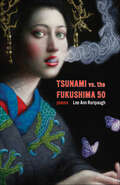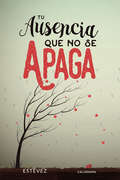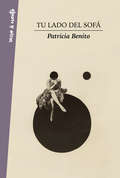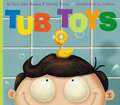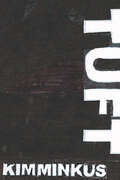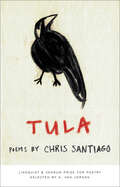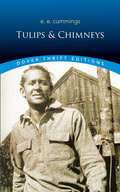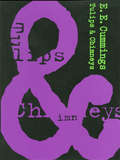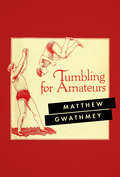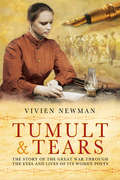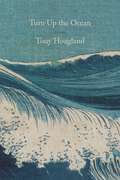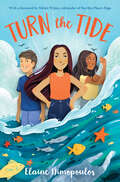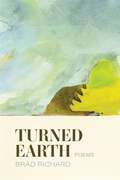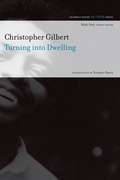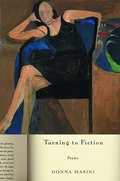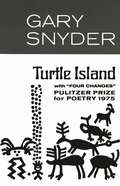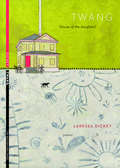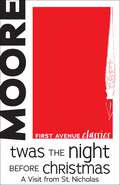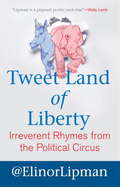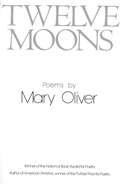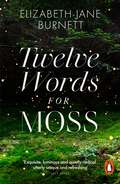- Table View
- List View
Tsunami vs. the Fukushima 50: Poems
by Lee Ann RoripaughIn March 2011, a tsunami caused by an earthquake collided with nearby power plant Fukushima Daiichi, causing the only nuclear disaster in history to rival Chernobyl in scope. Those who stayed at the plant to stabilize the reactors, willing to sacrifice their lives, became known internationally as the Fukushima 50. In tsunami vs. the fukushima 50, Lee Ann Roripaugh takes a piercing, witty, and ferocious look into the heart of the disaster. Here we meet its survivors and victims, from a pearl-catcher to a mild-mannered father to a drove of mindless pink robots. And then there is Roripaugh’s unforgettable Tsunami: a force of nature, femme fatale, and “annihilatrix.” Tsunami is part hero and part supervillain—angry, loud, forcefully defending her rights as a living being in contemporary industrialized society. As humanity rebuilds in disaster’s wake, Tsunami continues to wreak her own havoc, battling humans’ self-appointed role as colonizer of Earth and its life-forms. “She’s an unsubtle thief / a giver of gifts,” Roripaugh writes of Tsunami, who spits garbage from the Pacific back into now-pulverized Fukushima. As Tsunami makes visible her suffering, the wrath of nature scorned, humanity has the opportunity to reconsider the trauma they cause Earth and each other. But will they look?
Tu ausencia que no se apaga
by EstévezVersos escritos con la soledad, sangrando en la punta de los dedos. Libro de poemas de amor y desamor.
Tu lado del sofá
by Patricia BenitoDespués del éxito de Primero de poeta, Patricia Benito vuelve con su segundo poemario. Un canto a la magia de lo cotidiano, al pequeño lugar que ocupamos en el mundo. Tu lado del sofá es una despedida. Son los pedazos que no me atreví a rescatar del naufragio. Es un duelo a vida contra el espejo. Un sentirme nosotras. Es ser casa, canción de domingo y paz. Es un cuarto creciente a medio tempo. Es aprender a echar de menos sin que duela. Son todas esas veces que dejé de hacer por miedo a perder. Tu lado del sofá es recuperar -por fin- el metro sesenta desde el que partí.
Tu lado del sofá
by Patricia BenitoDespués del éxito de Primero de poeta, Patricia Benito vuelve con su segundo poemario. Un canto a la magia de lo cotidiano, al pequeño lugar que ocupamos en el mundo. Tu lado del sofá es una despedida. Son los pedazos que no me atreví a rescatar del naufragio. Es un duelo a vida contra el espejo. Un sentirme nosotras. Es ser casa, canción de domingo y paz. Es un cuarto creciente a medio tempo. Es aprender a echar de menos sin que duela. Son todas esas veces que dejé de hacer por miedo a perder. Tu lado del sofá es recuperar -por fin- el metro sesenta desde el que partí.
Tub Toys
by Timothy M. Warner Terry Miller ShannonWhen his father calls out "Bath time," a young boy starts gathering all of the toys that will make his bathing fun.
Tuft
by Kim MinkusTuft: "A bunch (natural or artificial) of small things, usually soft and flexible, ...fixed or attached at the base." - OED With Tuft, Kim Minkus takes us on flights of poetic fancy into futures where we "observe the green elite" and "iceplants bloom in the monotony of paved paths." We tangle and climb into language and are swept into the lives of the animals that haunt the shores of our city's waterways. This is a world where worker, lover, animal and poet unite. Minkus brings Venus and Satan into one sentence and in doing so unleashes the "bitter-broken-fallen" of our world. This is a gathering that calls out to the reader to pay attention and look closely. Tuft reminds us that without words our bodies would not exist and that only time makes us secret. We are all attached to something.
Tula: Poems
by Chris SantiagoA debut poetry collection exploring themes of family and identity while examining the experiences of a second-generation Filipino immigrant in America.Tula: a ruined Toltec capital; a Russian city known for its accordions; Tagalog for “poem.”Prismatic, startling, rich with meaning yet sparely composed, Chris Santiago’s debut collection of poems—selected by A. Van Jordan as the winner of the 2016 Lindquist & Vennum Prize for Poetry—begins with one word and transforms it, in a dazzling sleight of hand, into a multivalent symbol for the immigrant experience. Tula: Santiago reveals to readers a distant land devastated by war. Tula: its music beckons in rhythms, time signatures, and lullabies. Tula: can the poem, he seems to ask, build an imaginative bridge back to a family lost to geography, history, and a forgotten language?Inspired by the experiences of the second-generation immigrant who does not fully acquire the language of his parents, Tula paints the portrait of a mythic homeland that is part ghostly underworld, part unknowable paradise. Language splinters. Impossible islands form an archipelago across its landscape. A mother sings lullabies and a father works the graveyard shift in Saint Paul—while in the Philippines, two dissident uncles and a grandfather send messages and telegrams from the afterlife.Deeply ambitious, a collection that examines the shortcomings and possibilities of both language and poetry themselves, Tula introduces a major new literary talent.Praise for Tula“A book that both transports us and transforms us.” —Viet Thanh Nguyen“A debut collection that is a spare, elegant engagement with language. . . . Santiago’s struggles with identity are well-explored, but his linguistic savvy and precision truly stand out.” —Publishers Weekly“Santiago seems to recognize that words will always hold power, even as their meanings evolve. Through everything, Tula delves into these nuances of language: how it is suppressed, how it is weaponized, how it loves, how it informs, and how it is often as fleeting as a birdsong. Tula is therefore a celebration of the ephemeral and the permanent, a lovely testament to the beauty of contradiction.” —Chicago Review of Books
Tulips & Chimneys (Dover Thrift Editions)
by E. E. CummingsEdward Estlin Cummings (1894–1962), a native of Cambridge, Massachusetts, and a Harvard University graduate, is best known for his rejection of traditional poetic forms. As e. e. cummings, he conducted radical experiments with spelling, syntax, and punctuation that inspired a revolution in twentieth-century literary expression and excited the admiration and affection of poetry lovers of all ages. With his 1923 debut, Tulips & Chimneys, the 25-year-old poet rattled the conservative literary scene, directing his avant-garde approach to the traditional subjects of love, life, time, and beauty. His playful treatment of punctuation and language adds enduring zest to such popular and oft-anthologized poems as "All in green went my love riding," "in Just-," "Tumbling-hair," "O sweet spontaneous," "Buffalo Bill's," and "the Cambridge ladies who live in furnished souls." This edition presents complete and textually accurate editions of Cummings's work, in keeping with the original manuscripts and the poet's intentions.
Tulips and Chimneys
by E. E. CummingsFresh and candid, by turns earthy, tender, defiant, and romantic, Cummings's poems celebrate the uniqueness of each individual, the need to protest the dehumanizing force of organizations, and the exuberant power of love.
Tumble Bumble
by Felicia BondA tiny bug goes for a walk, but it's no ordinary stroll. Soon he bumps into a cat, then a crocodile, and even a baby pig! More creatures join in, until they tippy-toe into a mysterious yellow house belonging to a young boy, who happily tumble bumbles right along with them. In this charming cumulative tale, Felicia Bond takes readers on a rhythmic adventure that counts new friends up to ten.
Tumbling for Amateurs
by Matthew GwathmeyA reimagining of an instructional text on tumbling supports poems about the amateurishness of being human. Tumbling for Amateurs is a reimagining of James Tayloe Gwathmey’s 1910 book of the same name, published as part of Spalding’s Athletic Library. Bookended with “Propositions” on why tumbling is a skill that everyone should learn and “Extracts from Letters of Support,” each verso poem in this collection pairs with a recto illustration based on drawings from the source text. In the spirit of William Blake’s Songs of Innocence and of Experience, word and image work for each other, creating something more than just an instructional manual. Tumbling is, well, a metaphor for everything. And we all are, well, amateurs. Experimentation abounds in these poems and manipulated pictures. There are anaphoras, list sonnets, erasures, palimpsests and concrete poems, all working from tumbling’s limited vocabulary and central focus of acrobatics and gymnastics. In this experimentation of form and text is a search for the lyric, for an emotional connection when one isn’t always possible, in bodies, in movement, in desire. “We measure our lives by what our bodies can do.” “We have no other way to touch each other. / Really no other way to touch each other. / We seek this particular exercise because / we have no other way to touch each other." Like the tumbling acts from which they spring, Gwathmey's poems are delightfully performative. They leap, loop, and reconfigure familiar forms into fresh and acrobatic new intimacies. Slyly queering his source text — an early 20th century tumbling manual for young men salvaged from the dusty closet of family history — Gwathmey transforms instruction into seduction as he conducts a tender and playful archeology of desire." – Suzanne Buffam, author of A Pillow Book"Matthew Gwathmey’s poems, springboarding from a genre of fitness manual popular in the early twentieth century, tumble us into the present through tests gamily set for body and mind. As ripped as his gymnast protagonists—evoked so fetchingly in the book’s illustrations—Gwathmey writes a poetry eschewing the lyrical in favour of a stripped-down, athletic language that gives shape to 'what must remain / nameless.' There’re so many ways to read ourselves into Tumbling for Amateurs. Go toe to toe with these poems and they’ll tone up your grip on what poetry is." – John Barton, author of Lost Family
Tumult & Tears: The Story of the Great War Through the Eyes and Lives of Its Women Poets
by Vivien NewmanDuring the First World War and its immediate aftermath, hundreds of women wrote thousands of poems on multiple themes and for many different purposes. Womens poetry was published, sold (sometimes to raise funds for charities as diverse as Beef Tea for Troops or The Blue Cross Fund for Warhorses), read, preserved, awarded prizes and often critically acclaimed. Tumult and Tears will demonstrate how womens war poetry, like that of their male counterparts, was largely based upon their day-to-day lives and contemporary beliefs. Poems are placed within their wartime context. From war worker to parent; from serving daughter to grieving mother, sweetheart, wife; from writing whilst within earshot of the guns, whilst making the munitions of war, or whilst sitting in relative safety at home, these predominantly amateur, middle-class poets explore, with a few tantalising gaps, nearly every aspect of womens wartime lives, from their newly public often uniformed roles to their sexuality.
Turn Up the Ocean: Poems
by Tony HoaglandThe final book of poems by Tony Hoagland, “one of the most distinctive voices of our time” (Carl Dennis).Over the course of his celebrated career, Tony Hoagland ventured fearlessly into the unlit alleys of emotion and experience. The poems in Turn Up the Ocean examine with an unflinching eye and mordant humor the reality of living and dying in a time and culture that conspire to erase our inner lives. Hoagland’s signature wit and unparalleled observations take in long-standing injustices, the atrocities of American empire and consumerism, and our ongoing habit of looking away. In these poems, perseverance depends on a gymnastics of skepticism and comedy, a dogged quest for authentic connection, and the consolations of the natural world. Turn Up the Ocean is a remarkable and moving collection, a fitting testament to Hoagland’s devotion to the capaciousness and art of poetry.
Turn the Tide
by Elaine DimopoulosTwelve-year-old Mimi Laskaris is inspired by the Wijsen sisters of Bali to turn her focus from classical piano to a new obsession: forming a grassroots, kid-led movement to ban plastic bags in her new island home in Florida. Written in accessible verse, this timely story of environmental activism has extensive back matter for aspiring activists. With a foreword by Melati Wijsen, cofounder of Bye, Bye Plastic Bags.Mimi has a plan for her seventh grade year: play piano in the Young Artists competition at Carnegie Hall with her best friend, Lee; enjoy a good old Massachusetts snow day or two; and work in her community garden plot with her dad. But all that changes when her family’s Greek restaurant falls on hard times.The Laskarises’ relocation to Wilford Island, Florida, is a big key change for Mimi. Where does she fit in in this shell-covered paradise without Lee? Mimi is taken by the beauty of the island and alarmed by the plastic pollution she sees on the beaches.Then her science teacher, Ms. Miller, shows her class a TED Talk by Melati and Isabel Wijsen. At ages twelve and ten, they lobbied to ban single-use plastic bags on their home island of Bali—and won. Their story strikes a chord for Mimi. She’s twelve.Could a kid like her make such a big change in a place that she’s not yet sure feels like home? Can she manage to keep up with piano, her schoolwork, and activism? And does confident and flawless Carmen Alvarez-Hill really want to help her with the movement?In this story of environmental activism, friendship, and self-discovery, Mimi figures out what’s truly important to her, and takes her place in the ranks of real-life youth activists like the Wijsen sisters, Greta Thunberg, and Isra Hirsi.
Turned Earth: Poems
by Brad RichardTurned Earth, the fifth collection of poems by Brad Richard, offers a portrait of the artist as a grieving son who is also a husband, teacher, gardener, and attentive witness to our precarious world. Navigating life after his mother’s death, the speaker uses memory and imagination to understand, as one poem’s title declares, “How I Came to This.” Tender and trenchant, elegiac yet often livened by humor, Richard’s poems affirm the sustaining power of hope and love.
Turning Points: When Everything Changes
by Lewis GardnerA collection of stories, poem and plays for middle school students.
Turning into Dwelling: Poems (Re/view Ser.)
by Christopher GilbertA milestone publication of the late Christopher Gilbert's poetry, with an introduction by the National Book Award winner Terrance HayesLord, the anguish of my Black block rises up in melike a grief. My only chance to go beyond being breach—to resist being quelled as a bit of inner city entropy—is to speak up for the public which has birthed me.To build this language house. To make this case. Create.This loving which lives outside time. Lord, this is time. —from "Turning into Dwelling" Christopher Gilbert's award-winning Across the Mutual Landscape has become an underground classic of contemporary American poetry. Now reissued and presented with Gilbert's never-before-published last manuscript written before his death in 2007, Turning into Dwelling offers new readers the original music and vision of one of our most inventive poets.
Turning to Fiction: Poems
by Donna MasiniDaring and witty, erotic and searching, these poems explore the ways we suffer and are changed by our losses. "Think about sex," this book begins, then moves through the places into which our longings lead us. Here are confessions whispered over the phone in "Phone Sex," sins recounted to priests, "pretend confessions" told to a sister. Here are poems about a mother teaching a daughter to read, a girl trying to read her mother, a woman trying to read lovers, and marriage, and herself.
Turtle Island
by Gary SnyderWinner of the Pulitzer Prize for Poetry (1975). These Pulitzer Prize-winning poems and essays by the author of No Nature range from the lucid, lyrical, and mystical to the political. All, however, share a common vision: a rediscovery of North America and the ways by which we might become true natives of the land for the first time.
Tuxedo Weather
by David DennyDavid Denny's poetry takes the little things and life and brings them alive in ways that change the way the reader sees them
Twang
by Laressa DickeyTwang offers readers the increasing power of the voice and the danger of one's words being used against them. What can save you can also make you wretch. Repentance, in Twang, is a great idea but something far off. What is the speaker offered in its place? You can leave. You can find some way out.
Twas the Night before Christmas: A Visit from St. Nicholas (First Avenue Classics ™)
by Clement Clarke MooreIt's a quiet Christmas Eve. The snow is fresh and white, the kids are tucked in and dreaming, and even the mice are snug in their homes. But wait—what's that clatter? This classic Christmas poem was first published anonymously in a newspaper 1823, and it later appeared in an anthology of poetry from the American author Clement Clarke Moore in 1844. This unabridged version from a 1912 edition includes color illustrations from American artist Jessie Willcox Smith.
Tweet Land of Liberty
by Elinor LipmanElinor Lipman (@elinorlipman) chronicles the 2012 election season with a poem a day--all in 140 characters or less.Judy Blume "It's nice to see that Lipman's wit has escaped the hell of Twitter and collected itself in a book." --Jonathan Franzen, author of Freedom "A devotion of fearless, sassy, sublime insights, that should be carried into the voting booth of our daily lives--each poem read again and again--before any lever is pulled." --Nikky Finney, winner of the 2011 National Book Award for Poetry "So it has come to this! Of thee I zing. I love it." --Lois Lowry "The only sane, smart and witty thing to come out of the Republican primaries." --Stephen McCauley "Jon Stewart in 140 characters -- and in the morning. What could be better?" --Stacy Schiff "Winsome, witty and winning! I don't know how she does it!! " --Anita Shreve "Elinor Lipman tweets like a nightingale with an eagle eye." --Cathleen Schine "Dorothy Parker, Ogden Nash, Calvin Trillin, and Elinor Lipman!!" --Mameve Medwed "Elinor Lipman is to tweets what Shakespeare is to sonnets." --Firoozeh Dumas "There once was a Lipman on Twitter, who made every liberal titter." --Michael Lowenthal "I'm beset with Lipmania." --Henry Alford "Wise and sassy and too fun to miss!" --Jill McCorkle
Twelve Moons
by Mary Oliver(from the back cover) Joyce Carol Oates has praised Mary Oliver's "ability, rare and undefinable and yet unmistakable, to fuse content and style... to make technique serve art," while Archibald MacLeish has told her: "You have indeed entered the kingdom. You have done something better than create your own world: you have discovered the world we all live in and do not see and cannot feel." In her fourth volume of poetry, Twelve Moons, Mary Oliver continues to explore the alluring, yet well-nigh inaccessible kingdoms of nature and human relationships, and man's profound, persistent desire for a joyous union with them. These vibrant, magical poems pulse with an aching awareness of nature's unaffected beauty. But too often man - caught in his private kingdoms, haunted by past memories and future uncertainties - loses sight of nature's enigmatic promise of renewal. Mary Oliver reminds us of our deepest desires, our most ancient longings for a unified universe. Her absorbing, intimate vision leads us into the natural and human kingdoms we only fleetingly grasp. The author of three previous volumes of poetry - No Voyage and Other Poems; The River Styx, Ohio and Other Poems; and The Night Traveler - Mary Oliver has published her poems in many prestigious publications, including Harpers, The Atlantic, The New Republic, Yankee, Poetry Northwest, and Antioch Review. She lives in Provincetown, Massachusetts.
Twelve Words for Moss: Love, Loss And Moss
by Elizabeth-Jane BurnettSHORTLISTED FOR THE JHALAK PRIZE 2024Shortlisted for the Wainwright Prize 2023 for Nature Writing'Exquisite, luminous and quietly radical . . . utterly unique and refreshing' Lucy JonesWhere nothing grows, moss is the spark that triggers new life. Embarking on a journey though landscape, memory and recovery, Elizabeth-Jane Burnett explores this mysterious, ancient marvel of the plant world, meditating on and renaming her favourite mosses – from Glowflake to Little Loss – and drawing inspiration from place, people and language itself. 'Fascinating, subtle and risk-taking . . . Poetry, descriptive-evocative prose, memory, memoir, natural history and more all drift and mingle in strikingly new ways' Robert Macfarlane
